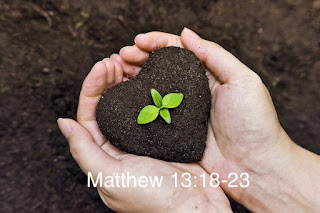The
Scriptures I meditated on today helped me center myself and focus on what’s
truly important (at least until I’m finished writing—then I’ll probably revert
back to my usual sinful self). Jesus
shares the simple but profound message that He is the bread of life and whoever
comes to Him will never hunger and whoever believes in Him will never thirst
(John 6:35). But it seems that we don’t
always readily embrace this powerful message.
My life is
filled with blessings. After many years
of employment, I’m really enjoying retirement! I share love with many family members and
friends. Yet there are still times when
I find myself overextended and under-appreciated. When I get overly tired I can find myself
being drawn into envy and the loneliness supported by consumerism and
individualism. The sixteenth chapter of
Exodus opens with the Israelite community complaining about being led into the
dessert and fearing they will die of famine.
God sends them bread, so they’ll know that He the Lord is their God (Exodus
16:2-15).
Social media
can be a place where we compare our lives to others in an unhealthy way. But it can also be a place where we can
celebrate joys experienced by others and be in solidarity with those who are
hurt. And in a surprising way we can get
inspiration from social media. A friend
just posted this: Stop worrying about
how it is going to happen and start believing it will. This is something God might have said to the
Israelites.
In one of
his letters, Paul is guiding the Ephesians to their true lives. He tells them they must no longer live in the
futility of their minds (Ephesians 4:17-24).
This advice rings so true today as it’s easy to fall into the trap of
thinking we can reason our way through any situations. We start to think we can rely only on our own
resourcefulness rather than rely on God’s grace.
Paul goes on
to say that we should put away the old self of our former way of life,
corrupted through deceitful desires, and be renewed in the spirit of our minds
and put on the new self, created in God’s way of righteousness and holiness of
truth. I find setting aside my
comfortable habits to be very challenging.
Even the habits and patterns that don’t always help me be my best self
are like a well-worn pair of shoes. I’m
barely aware of their presence in my life.
Putting away my old self requires active intentions.
Pope Francis,
in one of his writings, helps us explore ways we can put on our new self: “Do
you work for a living?” the Pope asks. “Be holy by laboring with integrity and
skill in the service of your brothers and sisters.”
He goes on
to say, “Don’t be afraid of holiness. It
will take away none of your energy, vitality or joy. On the contrary, you will become what the
Father had in mind when He created you, and you will be faithful to your
deepest self. To depend on God sets us
free from every form of enslavement and leads us to recognize our great
dignity.
In John’s
Gospel especially, we see Jesus in His truly human form. He’s tired after feeding the large crowds of
people with loaves and fishes. And yet
there are cries from people in the crowd who still want proof of who Jesus is
by demanding He perform miracles.
Although frustrated with the demands of the crowd and their disbelief,
Jesus continues to guide and teach. He
shares that it’s important to not work for food that perishes but for the food
that gives eternal life (John 6:24-35). I think of the times when I’m searching for an
answer to a challenging situation, so I can imagine the confusion people in the
crowd must have experienced when they heard Jesus say that the way to
accomplish the work of God is to believe in the one He sent. That teaching is simultaneously so simple and
so complex.
As I prayed
today with these Scriptures, I explored these questions: How can I trust the word of the Lord? Where do I see examples of someone who lives
on the true bread of life? What steps
can I take to put away my old self? Who
can I invite into my life to help me stop working so hard for food that will
perish but rather seek the food that gives eternal life?
“One does not live on bread alone, but by
every word that comes forth from the mouth of God.” (Matthew 4:4)


















